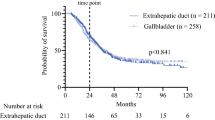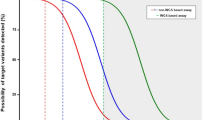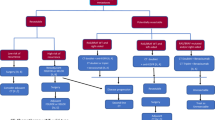Abstract
Background
Microsatellite instability (MSI) is the molecular marker for DNA mismatch repair deficiency (dMMR) in colorectal cancer (CRC) and has been associated with better survival outcomes in early stage disease. In metastatic CRC (mCRC), outcomes for patients with MSI are less clear. There is evolving evidence that treatment pathways for MSI CRC should include programmed-death 1 (PD-1) antibodies.
Objective
An analysis was performed to explore the impact of MSI status on overall survival (OS) in mCRC.
Patients and methods
South Australian Metastatic CRC Registry data were analysed to assess patient characteristics and survival outcomes, comparing patients with MSI CRC with those whose tumours were microsatellite stable (MSS). Kaplan–Meier survival analysis was used to assess OS. Cox regression analysis was undertaken to assess the independence of MSI as a prognostic factor.
Results
Of 4359 patients registered on the database, 598 (14%) had been tested for, and 62 (10.1%) of these patients had, demonstrable MSI. There were significantly higher rates of right-sided primary (p < 0.001), poorly differentiated pathology (p = 0.002), and BRAF V600E mutation (p < 0.001) in the MSI group. The MSI group were also less likely to receive chemotherapy (p < 0.001) or to have liver surgery, but more likely to be diagnosed at an early stage. The median overall survival was 9.5 months for those with MSI CRC versus 21.3 months for MSS CRC patients (p = 0.052). Cox regression analysis indicated that MSI was not an independent predictor of OS. Independent predictors of better OS included having liver surgery for metastasis, having chemotherapy, and being initially diagnosed at an early stage.
Conclusions
Only 14% of patients with mCRC were tested for MSI, and 1 in 10 were found to be MSI high. The clinical characteristics of MSI mCRC are in keeping with those previously reported. MSI in this population-based registry was associated with a numerically lower survival which did not attain statistical significance.

Similar content being viewed by others
References
Arnold M, Sierra MS, Laversanne M, Soerjomataram I, Jemal A, Bray F. Global patterns and trends in colorectal cancer incidence and mortality. Gut. 2017;66(4):683–91.
Grothey A, Marshall JL. Optimizing palliative treatment of metastatic colorectal cancer in the era of biologic therapy. Oncology. 2007;21(5):553-64.
Tran B, Kopetz S, Tie J, Gibbs P, Jiang ZQ, Lieu CH, et al. Impact of BRAF mutation and microsatellite instability on the pattern of metastatic spread and prognosis in metastatic colorectal cancer. Cancer. 2011;117(20):4623–32.
Loree JM, Kopetz S. Recent developments in the treatment of metastatic colorectal cancer. Ther Adv Med Oncol. 2017;9(8):551–64.
Le DT, Uram JN, Wang H, Bartlett BR, Kemberling H, Eyring AD, et al. PD-1 blockade in tumors with mismatch-repair deficiency. N Engl J Med. 2015;372(26):2509–20.
Weisenberger DJ, Siegmund KD, Campan M, Young J, Long TI, Faasse MA, et al. CpG island methylator phenotype underlies sporadic microsatellite instability and is tightly associated with BRAF mutation in colorectal cancer. Nat Genet. 2006;38(7):787–93.
Boland CR, Thibodeau SN, Hamilton SR, Sidransky D, Eshleman JR, Burt RW, et al. A National Cancer Institute workshop on microsatellite instability for cancer detection and familial predisposition : development of international criteria for the determination of microsatellite instability in colorectal cancer. Cancer Res. 1998;58:5248–57.
Kim CG, Ahn JB, Jung M, Beom SH, Kim C, Kim JH, et al. Effects of microsatellite instability on recurrence patterns and outcomes in colorectal cancers. Br J Cancer. 2016;115(1):25–33.
Overman MJ, McDermott R, Leach JL, Lonardi S, Lenz HJ, Morse MA, et al. Nivolumab in patients with metastatic DNA mismatch repair-deficient or microsatellite instability-high colorectal cancer (CheckMate 142): an open-label, multicentre, phase 2 study. Lancet Oncol. 2017;18(9):1182–91.
Venderbosch S, Nagtegaal ID, Maughan TS, Smith CG, Cheadle JP, Fisher D, et al. Mismatch repair status and BRAF mutation status in metastatic colorectal cancer patients: a pooled analysis of the CAIRO, CAIRO2, COIN, and FOCUS studies. Clin Cancer Res. 2014;20(20):5322–30.
Fujiyoshi K, Yamamoto G, Takenoya T, Takahashi A, Arai Y, Yamada M, et al. Metastatic pattern of stage IV colorectal cancer with high-frequency microsatellite instability as a prognostic factor. Anticancer Res. 2017;37(1):239–47.
Overman MJ, Lonardi S, Wong KYM, Lenz HJ, Gelsomino F, Aglietta M, et al. Durable clinical benefit with Nivolumab plus Ipilimumab in DNA mismatch repair–deficient/microsatellite instability–high metastatic colorectal cancer. J Clin Oncol. 2018;36(8):773–9.
Diaz L, Marabelle A, Kim TW, Geva R, Van Cutsem E, André T, et al. Efficacy of pembrolizumab in phase 2 KEYNOTE-164 and KEYNOTE-158 studies of microsatellite instability high cancers. Ann Oncol. 2017;28(suppl_5):386.
Lindor NM, Burgart LJ, Leontovich O, Goldberg RM, Cunningham JM, Sargent DJ, et al. Immunohistochemistry versus microsatellite instability testing in phenotyping colorectal tumors. J Clin Oncol. 2002;20(4):1043–8.
Yokota T, Ura T, Shibata N, Takahari D, Shitara K, Nomura M, et al. BRAF mutation is a powerful prognostic factor in advanced and recurrent colorectal cancer. Br J Cancer. 2011;104(5):856–62.
Lochhead P, Kuchiba A, Imamura Y, Liao X, Yamauchi M, Nishihara R, et al. Microsatellite instability and BRAF mutation testing in colorectal cancer prognostication. J Natl Cancer Inst. 2013;105(15):1151–6.
Phipps AI, Limburg PJ, Baron JA, Burnett-Hartman AN, Weisenberger DJ, Laird PW, et al. Association between molecular subtypes of colorectal cancer and patient survival. Gastroenterology. 2015;148(1):77–87 e72.
Roelands J, Kuppen PJK, Vermeulen L, Maccalli C, Decock J, Wang E, et al. Immunogenomic classification of colorectal cancer and therapeutic implications. Int J Mol Sci. 2017;18(10). https://doi.org/10.3390/ijms18102229.
Thanki K, Nicholls ME, Gajjar A, Senagore AJ, Qiu S, Szabo C, et al. Consensus molecular subtypes of colorectal cancer and their clinical implications. Int Biol Biomed J. 2017;3(3):105–11.
Müller CI, Schulmann K, Reinacher-Schick A, Andre N, Arnold D, Tannapfel A, et al. Predictive and prognostic value of microsatellite instability in patients with advanced colorectal cancer treated with a fluoropyrimidine and oxaliplatin containing first-line chemotherapy. A report of the AIO colorectal study group. Int J Color Dis. 2008;23:1033–9.
Jung SH, Kim SH, Kim JH. Prognostic impact of microsatellite instability in colorectal Cancer presenting with mucinous, signet-ring, and poorly differentiated cells. Ann Coloproctol. 2016;32(2):58–65.
Copija A, Waniczek D, Witkos A, Walkiewicz K, Nowakowska-Zajdel E. Clinical significance and prognostic relevance of microsatellite instability in sporadic colorectal cancer patients. Int J Mol Sci. 2017;18(1):107.
Lenz HJ, Van Cutsem E, Limon ML, Wong KY, Hendlisz A, Aglietta M, et al. Durable clinical benefit with nivolumab (NIVO) plus low-dose ipilimumab (IPI) as first-line therapy in microsatellite instability-high/mismatch repair deficient (MSI-H/dMMR) metastatic colorectal cancer (mCRC). Ann Oncol. 2018;29(suppl8):LBA18_PR.
Author information
Authors and Affiliations
Corresponding author
Ethics declarations
Funding
No external funding was used in the preparation of this manuscript.
Conflict of Interest
Li Chia Chong, Amanda Rose Townsend, Joanne Young, Amitesh Roy, Cynthia Piantadosi, Jennifer E Hardingham, David Roder, Christos Karapetis, Robert Padbury, Guy Maddern, James Moore, and Timothy Jay Price declare that they have no conflicts of interest that might be relevant to the contents of this manuscript.
Rights and permissions
About this article
Cite this article
Chong, L.C., Townsend, A.R., Young, J. et al. Outcomes for Metastatic Colorectal Cancer Based on Microsatellite Instability: Results from the South Australian Metastatic Colorectal Cancer Registry. Targ Oncol 14, 85–91 (2019). https://doi.org/10.1007/s11523-018-0615-9
Published:
Issue Date:
DOI: https://doi.org/10.1007/s11523-018-0615-9




